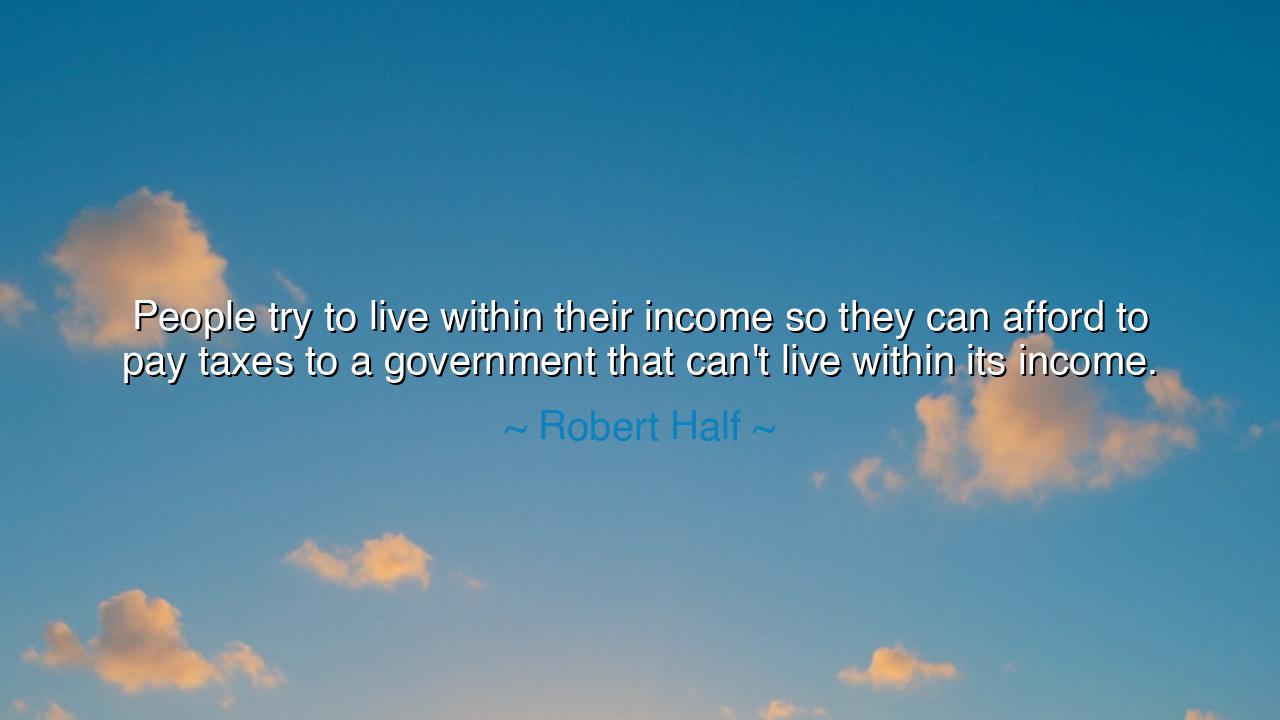
People try to live within their income so they can afford to pay
People try to live within their income so they can afford to pay taxes to a government that can't live within its income.






"People try to live within their income so they can afford to pay taxes to a government that can't live within its income." — Robert Half
Hear these words, O children of labor and reason, and feel the sting of irony that burns beneath their humor. Robert Half, a man of business and wisdom, spoke them not in jest alone, but in lament — for in this sharp and witty saying lies the sorrow of the working man and the folly of the powerful. When he declared, “People try to live within their income so they can afford to pay taxes to a government that can’t live within its income,” he cast light upon the strange inversion of justice that marks the modern world. For those who toil and measure every coin, who sacrifice and plan, are made to sustain a vast machine that spends without restraint, consumes without shame, and calls its excess “necessity.”
The meaning of this quote cuts deep into the heart of society’s imbalance. It reveals a moral and economic truth: that the discipline of the governed is often demanded to compensate for the waste of the governors. The ordinary man must balance his books, restrain his desires, and plan his future with prudence — yet the state, which commands his loyalty and his labor, does not abide by the same rule. It borrows against tomorrow, squanders the wealth of today, and calls it progress. Thus, Half’s words are not merely criticism — they are a call for integrity, for the ancient virtue of moderation, the wisdom of knowing one’s limits. For if individuals must live within their means to survive, how much more must governments, which bear the trust of millions, live within theirs to remain just?
The origin of this truth can be traced through all ages where rulers have forgotten restraint. From the empires of old to the republics of the present, the story is the same: when a government spends beyond its means, it does so not with its own blood, but with that of its people. Recall Ancient Rome, whose treasury, once full from conquest and trade, was emptied by the vanity of its leaders. To feed its luxuries and wars, Rome taxed its citizens until the spirit of the Republic was drained away. Bread and circuses were given to pacify the masses, but debt and decay hollowed the empire’s heart. And when the burden could no longer be borne, collapse followed — for no state, however mighty, can forever escape the arithmetic of reality.
So too in modern times, Half saw the same pattern unfolding. He lived in an age where governments expanded their reach, promising to solve all ills with the wealth of their citizens. The people worked, saved, and sacrificed — yet found that no matter how hard they tried to live wisely, the state’s hunger grew faster than their earnings. It was an age of deficits, of endless borrowing, of the illusion that prosperity could be built upon debt. The citizen learned thrift out of necessity; the government learned indulgence out of habit. Thus, Half’s quip was not mockery, but prophecy — for a society where the rulers ignore the lessons of the ruled is one that courts ruin.
There is a deeper moral lesson here, too. Half’s words remind us that responsibility is the foundation of freedom. A man who cannot govern his own desires becomes a slave to debt; a government that cannot govern its own appetite becomes a tyrant upon its people. The problem, therefore, is not merely financial — it is ethical. To spend what one does not have is to live in deceit; to burden future generations with present excess is to rob the unborn. True greatness in a nation, as in a man, lies not in how much it possesses, but in how wisely it uses what it has.
Look around, O hearers of truth, and you will see this wisdom confirmed. Nations rich in resources crumble under the weight of their waste, while smaller, humbler lands prosper through discipline and foresight. History shows that when a people demand virtue of themselves but excuse corruption in their rulers, they build their own chains. The farmer who tightens his belt to pay the tax, the worker who saves against hardship — they are the silent heroes of civilization. Yet their virtue becomes a mockery when the hand that takes from them cannot show the same restraint. As the old proverb says: “He who cannot manage his own house cannot govern a nation.”
So take this lesson as both warning and guide: let the virtues of the people become the virtues of their leaders. Let prudence rule over pride, and simplicity over greed. For the health of a nation depends not on the wealth of its treasury, but on the honesty of its stewardship. As citizens, demand accountability from those who govern; as individuals, live by the wisdom you wish to see in power. For when the people learn moderation and the state learns restraint, balance returns, and freedom endures. But if ever the day comes when governments devour what they cannot afford, and the people grow too weary to resist, then the end will not come with the roar of rebellion, but with the quiet sigh of a nation that has spent its soul into silence.






AAdministratorAdministrator
Welcome, honored guests. Please leave a comment, we will respond soon